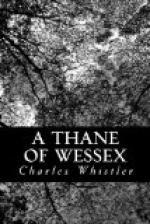“Come near, Thanes,” the king said in his deep, quiet voice. “Let us talk together of this matter as friends, for a useless king were I but for such as you who keep my throne from the blows of enemies.”
“Stay, Father,” said Alfred the Atheling, starting up. “Let me write while the thanes speak,” and he gathered up pens and such, and a roll of parchment, sitting down at the table and then holding pen ready, and looking at us.
The king smiled at him and his haste, and said, “Verily, Thanes, you must mind your words if Alfred writes them down, for he will ever keep records of tales such as yours, saying that they are for men to read hereafter.”
But that had no terrors for us, seeing that we had a plain tale to tell, truth and nothing more. So, as Ceorle bid us, we four sat down by the window, and the king asked me to tell my story from the first.
So I began by saying that I had seen the landing of the Danes at Stert, and warned the watchmen of the levy.
There Alfred stopped me, holding up his pen suddenly.
“Tell us, Thane, of the Watchet landing,” he said.
And when I began to tell of that he looked up again, with his eyes dancing, and asked me how I came on Quantock hill.
Thereat the king laughed a little, saying that Alfred should have been a lawman, and the atheling said that, with his father’s help, he meant to be such, and a good one.
And that he has become, for the laws he has given us will last, as it seems to me, till the name of Saxon has departed.
Then I was a little in doubt what to say, and the king saw this. So he told me kindly that he had had very full accounts written by the bishop and ealdormen; but now both he and the atheling would fain hear about myself; that is, if my friends already knew all, and if I would not heed Ceorle.
Now I saw that I must speak more of myself than I wished, and would fain have been excused, saying something of that sort. But the atheling asked me to think of them as friends who would feel for me, saying, too, that of my own history he would not write, and so kindly did he urge me, drawing me on, that at last I had told him all from the beginning of my troubles, even to the time when I rode with Alswythe into Glastonbury and sought the bishop.
“That is well told,” said Alfred, when I had finished so far, and the king sighed a little, but left all the speaking to his son.
“Now, Wulfhere,” he went on, “it is your turn,” and so made the old warrior take up the tale; but he bade him begin at the first fight.
However, Wulfhere must needs go back to the war arrow business, and then to the staying of the flight at Cannington, and in this Alfred did not stop him, though I thought it more than needed.




